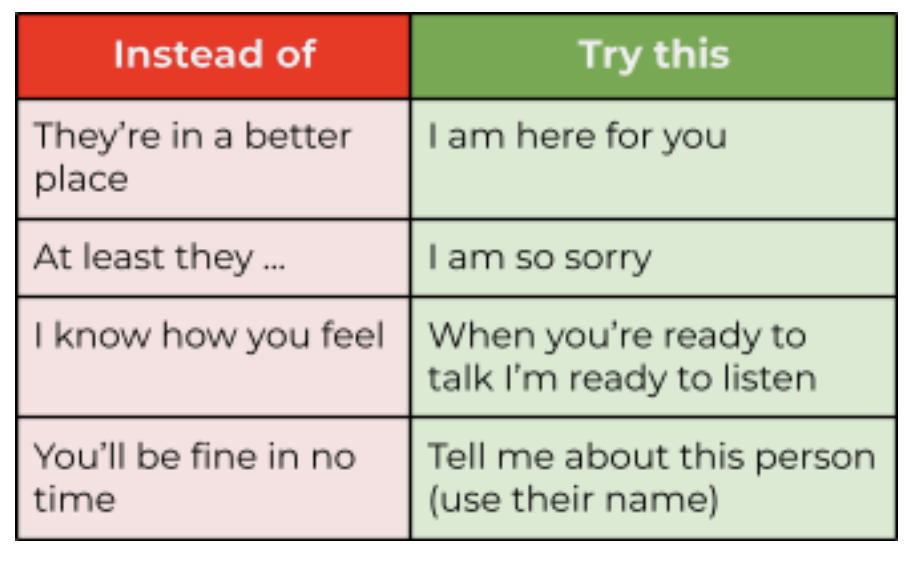Each individual in a school, District, and school community plays an essential role in supporting healing for those affected by a student or staff death. This website is meant to be a quick reference guide for a caring school response.
 “We want people to feel with us more than to act for us.” - George Eliot
“We want people to feel with us more than to act for us.” - George Eliot
Critical concepts for supporting grieving individuals
- The goal of every crisis response is to provide safety and security, allow for ventilation and validation, and predict and prepare for the future. Healing takes time and will involve many people and experiences.
- A caring check-in is always appropriate. Individuals who are grieving want to be noticed and need healing and supportive connections from those around them.
- Avoid discussing your own beliefs as an attempt to comfort someone who is grieving, listening without judgment is the key to supporting healing.
- You do not need a specific license, job, or role to practice compassion... it's everyone's job to care for each other.
- Your caring presence is essential, but you will never carry the full weight of another person's healing. You cannot "fix" it or remove their pain, but you can support healing in many small, meaningful ways. Offer what you can when you can, knowing that you may not always get the response you'd hoped for.
- Take a breath, you don't always have to have an answer, use all available resources.
- Each person's grief is unique and has no time limit, avoid minimizing another person's unique process for dealing with loss and remove your own judgments of what the timeline ought to be for healing. It's their healing, not yours.
“Grief shared is grief diminished” - Rabbi Grollman
Click here to access the Crisis Response Google Drive Folder
Must be logged in to JSD Google account to access
School Administrators
Leading a healing response requires full engagement, the best support any leader can offer individuals grieving a loss is to be present and engaged in the healing process.
What to anticipate in your role:
- Verify the facts of the death
- Consult with your AOS, District Support, and District Communications
- Contact the family of the deceased
- Coordinate meetings with the faculty, support teams, and community
- Support students, staff, and community in their healing
Helpful Handouts for School Administrators:
- School procedures checklist
- Needs Assessment
- Tips for a faculty meeting
- Tips for talking with a bereaved family
School Mental Health Team
The school mental health team is vital to healing following a loss. The most helpful thing a school mental health team member can do is be present with those who are struggling.
What to anticipate in your role:
- Offering individual and group counseling to those affected
- Consultation with administration, teachers, co-workers, and parents on how to support those that are grieving
- Coordinating care and long-term support for students after the incident
- Following up with students, teachers, administrators, and parents to meet ongoing needs
Helpful Handouts:
- School Mental Health Team Checklist
- Caring for the caregiver
- Tips for individual and group counseling
- FREE School-Based Grief Group Curriculum from Hospice of Piedmont
- Shared intervention tracker
Other Staff members
Each person in a school community plays a role in supporting healing, a proactive check-in with individuals who are struggling is always appropriate. While offering support in any role, ensure that individuals get to those that can help them the most.
What to anticipate in your role:
- Notice those around you (students and co-workers) who may benefit from a check-in
- Connect those that you notice to appropriate help
- Maintain routines while allowing some flexibility for those affected
- Take a breath, you don't always have to have an answer
Helpful Handouts
- Tips for Secondary Teachers
- Tips for Elementary Teachers
- Tips for Front Office Staff
- Answering Student Questions
- Addressing Grief in Children
- Additional Handouts can be found in the Google Drive
Compassionate questions for those who are grieving:
- Many people have strong reactions or feelings when someone they know dies. What has this been like for you?
- What kinds of things have you been thinking about since your loved one/friend died?
- What memories do you have of the person who died? (use their name)
- If you have experienced a loss in the past, or something challenging, what did you do? or what did others do (or didn't do) that helped?

